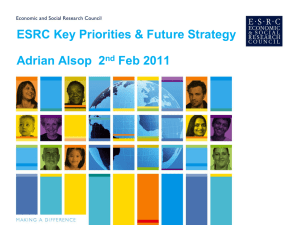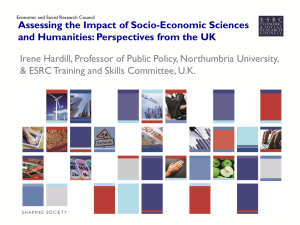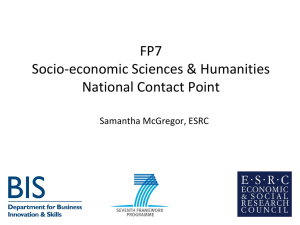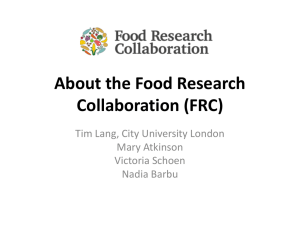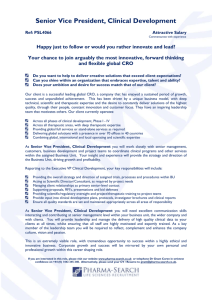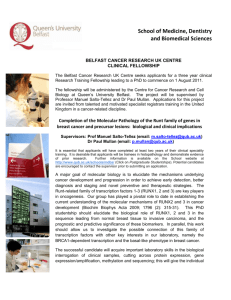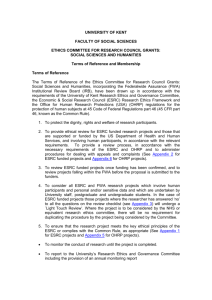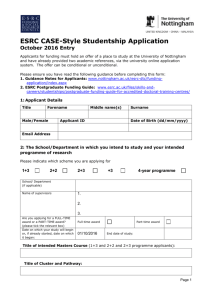3 ESRC PhD CASE Studentships
advertisement
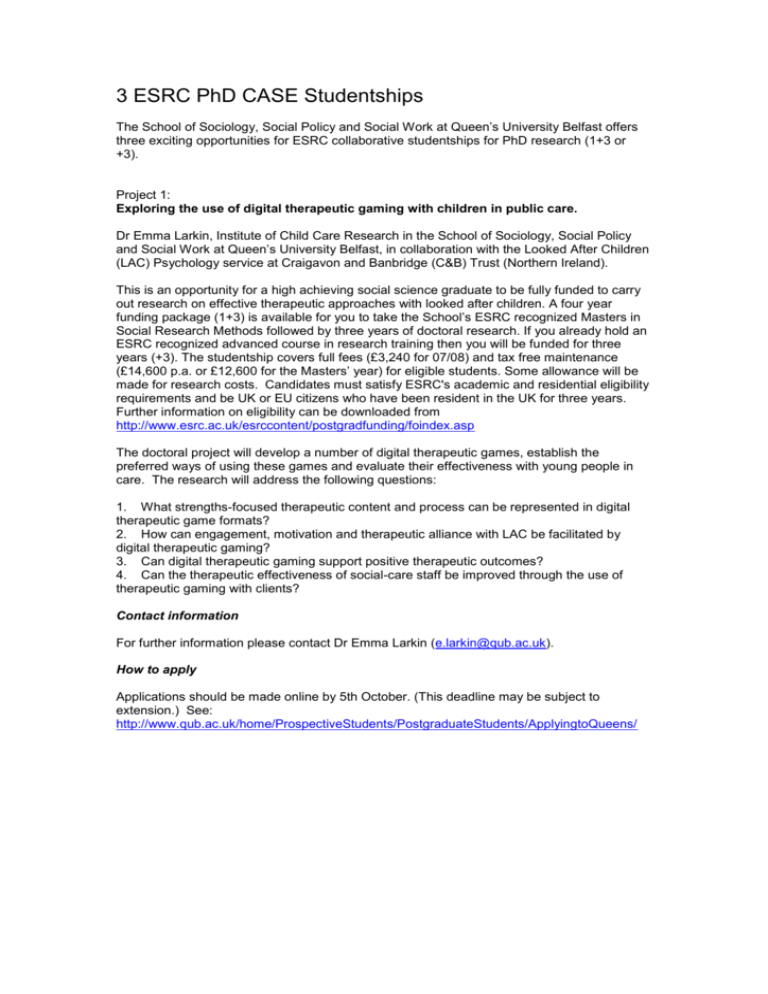
3 ESRC PhD CASE Studentships The School of Sociology, Social Policy and Social Work at Queen’s University Belfast offers three exciting opportunities for ESRC collaborative studentships for PhD research (1+3 or +3). Project 1: Exploring the use of digital therapeutic gaming with children in public care. Dr Emma Larkin, Institute of Child Care Research in the School of Sociology, Social Policy and Social Work at Queen’s University Belfast, in collaboration with the Looked After Children (LAC) Psychology service at Craigavon and Banbridge (C&B) Trust (Northern Ireland). This is an opportunity for a high achieving social science graduate to be fully funded to carry out research on effective therapeutic approaches with looked after children. A four year funding package (1+3) is available for you to take the School’s ESRC recognized Masters in Social Research Methods followed by three years of doctoral research. If you already hold an ESRC recognized advanced course in research training then you will be funded for three years (+3). The studentship covers full fees (£3,240 for 07/08) and tax free maintenance (£14,600 p.a. or £12,600 for the Masters’ year) for eligible students. Some allowance will be made for research costs. Candidates must satisfy ESRC's academic and residential eligibility requirements and be UK or EU citizens who have been resident in the UK for three years. Further information on eligibility can be downloaded from http://www.esrc.ac.uk/esrccontent/postgradfunding/foindex.asp The doctoral project will develop a number of digital therapeutic games, establish the preferred ways of using these games and evaluate their effectiveness with young people in care. The research will address the following questions: 1. What strengths-focused therapeutic content and process can be represented in digital therapeutic game formats? 2. How can engagement, motivation and therapeutic alliance with LAC be facilitated by digital therapeutic gaming? 3. Can digital therapeutic gaming support positive therapeutic outcomes? 4. Can the therapeutic effectiveness of social-care staff be improved through the use of therapeutic gaming with clients? Contact information For further information please contact Dr Emma Larkin (e.larkin@qub.ac.uk). How to apply Applications should be made online by 5th October. (This deadline may be subject to extension.) See: http://www.qub.ac.uk/home/ProspectiveStudents/PostgraduateStudents/ApplyingtoQueens/ Project 2. Examining Northern Irish adoptive parents’ perceptions and feeling regarding postadoption contact. Dr Dominic McSherry and Greg Kelly, School of Sociology, Social Policy and Social Work at Queen’s University Belfast, in collaboration with the British Association for Adoption and Fostering (BAAF) Northern Ireland. This is an opportunity for a high achieving social science graduate to be fully funded to carry out research on adoptive parents. A four year funding package (1+3) is available for you to take the School’s ESRC recognized Masters in Social Research Methods followed by three years of doctoral research. If you already hold an ESRC recognized advanced course in research training then you will be funded for three years (+3). The studentship covers full fees (£3,240 for 07/08) and tax free maintenance (£14,600 p.a. or £12,600 for the Masters’ year) for eligible students. Some allowance will be made for research costs. Candidates must satisfy ESRC's academic and residential eligibility requirements and be UK or EU citizens who have been resident in the UK for three years. Further information on eligibility can be downloaded from http://www.esrc.ac.uk/esrccontent/postgradfunding/foindex.asp The project is concerned with the following. While some adoptive parents do feel that some aspects of contact with the child’s birth family are helpful to the progress of an adoptive placement, others feel that it is a hindrance, and the general body of evidence regarding the impact of contact upon an adoptive placement is inconclusive. The findings of a longitudinal study of children’s care pathways and outcomes in Northern Ireland suggest that although most adoptive parents do feel that contact can be positive, some adoptive parents did raise specific concerns, such as: the difficulty retaining anonymity (Northern Ireland is a relatively small region); the child being upset when birth parents don’t avail of contact; stirring up difficult memories for the child; and challenges to their own parental role identity. Given the importance of the adoptive parents to the success of any adoptive placement, this study will examine these issues in greater depth, using semi-structured interviews and focus groups with adoptive parents. The study will have a particular focus upon the adoptive parents’ views on how contact may impact upon the success of the placement and should help identify possible areas of need in relation to future developments in policy and practice in this area. Familiarity with relevant agencies will be an advantage. Contact information For further information please contact Dr Dominic McSherry (dominic.mcsherry@qub.ac.uk). How to apply Applications should be made online by 5th October. (This deadline may be subject to extension.) See: http://www.qub.ac.uk/home/ProspectiveStudents/PostgraduateStudents/ApplyingtoQueens/ Project 3. Empowerment, partnership and participation in services for disabled children and their families. Professor Geraldine Macdonald, School of Sociology, Social Policy and Social Work at Queen’s University Belfast, in collaboration with the Southern Health and Social Services Board (Northern Ireland). This is an opportunity for a high achieving social science graduate, or a graduate with a background in nursing or social care, to be fully funded to carry out research on services for disabled children and their families. A four year funding package (1+3) is available for you to take the School’s ESRC recognized Masters in Social Research Methods followed by three years of doctoral research. If you already hold an ESRC recognized advanced course in research training then you will be funded for three years (+3). The studentship covers full fees (£3,240 for 07/08) and tax free maintenance (£14,600 p.a. or £12,600 for the Masters’ year) for eligible students. Some allowance will be made for research costs. Candidates must satisfy ESRC's academic and residential eligibility requirements and be UK or EU citizens who have been resident in the UK for three years. Further information on eligibility can be downloaded from http://www.esrc.ac.uk/esrccontent/postgradfunding/foindex.asp The project aims to explore the meaning, use and impact of key principles underpinning the development of current social policy and practice. The research questions are: 1. To what extent do professionals, parents and disabled children share a common understanding of working in partnership, consultation, advocacy and empowerment? 2. To what extent does Wraparound reflect their understanding and what difference does this make to their experience of services? 3. To what extent are parents and children actively involved in the design, delivery and evaluation of services? 4. To what extent do these features help to ensure that disabled children achieve their potential and realise their aspirations? 5. What theoretical frameworks of empowerment and partnership best describe the experiences of key stakeholders and best facilitate effective policy and practice? Contact information For further information please contact Professor Geraldine Macdonald (3041192@ads.qub.ac.uk) How to apply Applications should be made online by 5th October. (This deadline may be subject to extension.) See: http://www.qub.ac.uk/home/ProspectiveStudents/PostgraduateStudents/ApplyingtoQueens/
